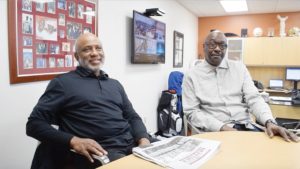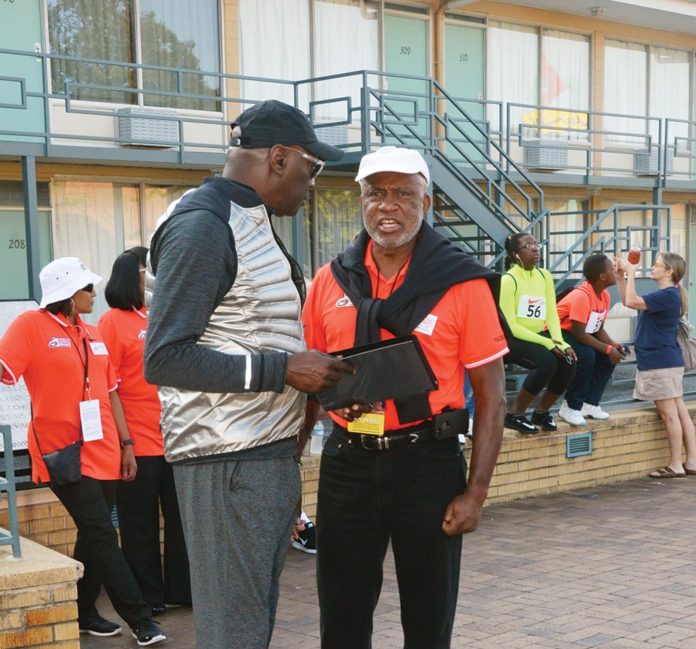Fred Jones and Willie Gregory have taken distinctly different paths to success. If they reversed course, their roads would lead them to within a few blocks of each other in South Memphis, ZIP code 38126.
Synonymous with the Southern Heritage Classic, Jones founded the event that annually pumps millions of dollars into the Memphis economy. Gregory is director of Global Community Impact and vice chairman of the Greater Memphis Chamber. They reflected on their journeys in the context of Dr. King and ZIP code 38126 as part of the TSD’s focus on the intersection of those two factors.
Jones and Gregory played football together at Booker T. Washington High School. In January of 1968, Gregory was a BTW senior, recovering from some tests he had not done well on. Jones was at Memphis State University (now the University of Memphis).
“I was doing so bad that I had flunked all my courses and getting ready to withdraw from school,” Jones said. “It was not a good time for me, but when you piece all of the story together, it was kind of a reason to set in motion a lot of things that happened later in life for me.”
At the time, Jones was living in 38126’s Cleaborn Homes housing project. He prefers to call it “community,” a “good place” with “the kind of support that you needed to have during a tough time.”
For Gregory, it was a village. “Everybody knew everybody…you interacted with each other.”
Jones lived on the north side of St. Paul St., Gregory stayed on the south side. Everybody came to L.E. Brown Park, went to Porter Jr. High School. Jones and Gregory went to Alonzo Locke Elementary School.
April 4, 1968
Gregory was just finishing track practice and heading to play baseball when he learned Dr. King had been shot.
“Somebody had been downtown and was coming back through Booker Washington and they said that Dr. King (had been shot). And then you started hearing all the emergency vehicles.”

Jones was working at a flower shop on Vance Ave.
“As I was leaving to walk home … I remember seeing all this activity downtown and I’m asking, man, what in the world is going on….I didn’t know Dr. King had gotten shot until I got home. It was on the news. … It was one of those devastating times for a young kid.”
Dr. King had been gunned down within five miles of them at the Lorraine Motel. Gregory’s mother had been very “into what was happening within the city. She was a member of the Shelby County Democratic Club…She talked about the horrifying, inhumane treatment that the garbage workers were receiving…
“My mother had broke it down: ‘They’re only asking for six cents an hour and (then Mayor Henry) Loeb doesn’t want to give them that.’ So I was pretty aware. When Dr. King came I thought that was very big.”
He went to Mason Temple on the night of April 3 but could not get in for what turned out to be Dr. King’s last speech.
Jones recalls not believing what was happening.
“You just don’t believe that somebody who is trying to do good for everybody is killed for whatever reason.”
38126
Recalling his grandfather saying, “You didn’t know you were poor until white folks told you you were poor,” Gregory had no sense of being poor while living in 38126.
Neither did Jones.
“My daddy made $40 a week and in some households that was on the high side. They were able to provide a good quality of life and a great support system for what we were doing….You never new all these other things about 38126 until later on. Once we start(ed) advancing in life and you look back and then they say, ‘Well, how did you make it from 38126?’”
The idea of “from 38126” doesn’t go down well. Jones said he and Gregory never “left” and that there are examples aplenty of where their hearts and spirits are anchored.
Remembering a community that was self-contained with ample stores and services, Gregory fast-forwarded and noted the opposite.
What happened?
“I’m going to say integration,” he said. “I always say corporate America opened its arms up to us and we started to move out and then all of a sudden it just evaporated.”
Places such as Cleaborn Homes were only supposed to be a fresh start for people who had been living in far worse conditions, Gregory said
“Your vision was supposed to be a lot wider, a lot longer. I think maybe … when they assassinated Dr. King, they … killed a dream in Memphis, Tennessee that had been all over the nation and was catching on…
“It was a dream to live in the Cleaborn Homes housing community because then you could get you a start. There are a number of people that started there, moved out and bought homes…”
Shattered – not killed –Jones said of “the dream.”
“Fifty years later we’re still trying to search for it, still trying to get it together, still having that sense of community that we got from the community…it’s not there. …”
The longtime friends from 38126 see change afoot. The last remaining public housing project, Foote Homes, recently has been torn down. Amid the change, they see their alma mater, Booker T. Washington, “doing a great job in the community under very adverse conditions.”
Can it be better?
Jones said Memphis has become a city of “used-to-be”
“Because I have been here 50 years, I know the way it was. I go into those same places, those businesses and the activity that was thriving in the community ‘used to be.’ … The grocery store ‘used to be’ at this corner. …Whatever they may have been, they were a viable part of the community then.”
What needs to happen?
“I’m very optimistic,” said Gregory. “Specifically, I’m going to stretch outside of 38126, stretch over into the city of Memphis, there has to be economic equality. There has got to be opportunity. And not only that, you have to take advantage of opportunity. Education is one of the big keys now. …
“I’m optimistic that we are going to get there. I am optimistic because the more you tell people what it used to be, what it was and how good it was, the more of that hunger, hopefully, will take in them. You can see some of the reinvestment in 38126 coming now.”
Taking advantage of opportunity is key, he said.
Jones said, “From a business standpoint, we need to have more impact on people, black people and do it unabashed. Because the more that we can do that, the better chance that we are going to have … The more people that are part of the economic process, then we can get some things done.
“It’s easy to talk to somebody if they’ve got a couple of dollars,” he said. “Sometimes people are just not going to understand what’s going on but at least they are going to have a little bit more leaning on, ‘Yeah, I got a nice job, I got this nice business. I got this nice contract. …We need to do that and not worry about, basically, who gets it.
“I want to be able to say from my vantage point, if you can do the job and do it officially, that’s what I need to have happen for me as a business owner. We need to have more people out there that are talking about (things) economically. Because if you don’t change it economically, it’s going to be very, very difficult.”
Gregory goes back to taking advantage of opportunity.
“You’ve got to take advantage of what is around you to have the economic impact. You’ve got to have a skill set that is in demand …You’ve got to really take a look at what you want to do. How can you as an individual make this better?
“Whether you are from 38126 or 38125, there is opportunity out there now that you’ve got to take advantage of.”




